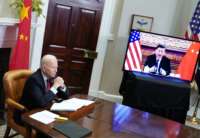
We live at a critical juncture in world history. In spite of immense progress in some areas of human civilization, the prospects of annihilation caused by interstate conflict among competing powers with unimaginably destructive weapons continue to haunt human relations in the early part of the 21st century even when challenges such as climatic catastrophes may end up being disastrous for all forms of life on planet Earth. A few decades ago, it was the U.S.-USSR conflict that threatened to blow up the planet, thanks to the imperial ambitions of a newly emerged empire in world history to remake the world in its own image. Today, it is the U.S.-China conflict that threatens us with a futuristic scenario of global annihilation as the Western empire in decline continues to insist upon dictating the direction of world affairs according to its own image and interests.
In the interview below, one of our most esteemed public intellectuals of the last half century, whose intellectual stature has been compared to that of Galileo, Newton and Descartes, offers us his own views and assessment of the increasingly dangerous tension between the United States and China. Noam Chomsky is Institute Professor Emeritus at MIT and currently Laureate Professor at the University of Arizona. The recipient of scores of highly prestigious awards, including the Sydney Peace Prize and the Kyoto Prize (Japan’s equivalent of the Nobel Prize), of dozens of honorary doctorate degrees from the world’s most renowned universities, and author of some 150 books on linguistics, politics, international affairs, history and media studies, Chomsky has had tremendous influence on a variety of areas of scholarly and scientific inquiry, including linguistics, logic and mathematics, computer science, psychology, media studies, philosophy, politics and international affairs.
C.J. Polychroniou: Noam, the U.S.-China relationship has gone through ups and downs over the course of the last 30 or so years. Clearly, the sort of relationship that exists today between the two countries is far more antagonistic than it was even 10 years ago. In your own view, what forces or processes are responsible for the increasing tensions we are witnessing today in U.S.-China relations?
Noam Chomsky: After the fall of the USSR, there was much euphoria about the end of history with “liberal democracy” (a code word for the U.S.) having achieved total victory. A corollary was that China could now be brought within the “rule-based international order.”
The latter is a now-conventional phrase, one worth pondering. It refers to an international order in which the U.S. sets the rules, displacing the international order established by the United Nations, which the U.S. deems antiquated and irrelevant. The UN Charter is the Supreme Law of the Land under the U.S. Constitution, constantly violated, a matter of no concern to those who pledge reverence for the Holy Text. Its provisions have been considered inappropriate for the modern world ever since the U.S. lost control of the UN with decolonization, and occasional backsliding among the privileged as well. UN members no longer know “how to play,” to borrow Thomas Friedman’s ridicule of France when it failed to support the benign U.S. invasion of Iraq, accompanied by his call for the miscreant to be deprived of its permanent membership in the Security Council. The self-described “world’s greatest deliberative body” contented itself with renaming French fries as “Freedom fries” in the Senate cafeteria.
Right-thinking people understand that the outdated UN-based international order is to be replaced by the rule-based order, including such constructions as the highly protectionist “free-trade agreements,” right now yielding such pleasures as barring a “people’s vaccine” that would alleviate the COVID disaster. The Clintonites were particularly enthusiastic about incorporating a well-disciplined China within this forward-looking rule-based order.
It didn’t work as planned. China refuses to play when it doesn’t want to. Worse still, it can’t be intimidated. It goes its own way. That way is often ugly, but that’s of no relevance to the rule-based order, which easily tolerates vicious crimes by the righteous — notably the Master — with equanimity and often approval.
China is not Europe. The countries of Europe may fume when the U.S. decides to destroy the joint agreement with Iran (the JCPOA) and to impose harsh sanctions to punish Iran for Washington’s demolition of the agreement. They may even proclaim that they will develop ways to avoid the murderous U.S. sanctions. But in the end, they go along, not willing to incur the wrath of the Godfather, or his punitive measures, such as expulsion from the international financial system, controlled by Washington. Same in many other cases.
China is different. It insists on the UN-based system (which it violates when it chooses to). As former Australian Prime Minister Paul Keating explained, the much-heralded “China threat” reduces to the fact that China exists and is successfully defying the rules.
It is not the first to do so. The charge of “successful defiance” comes from the annals of the U.S. State Department in the 1960s. It was directed against the “Cuban threat,” namely, Cuba’s “successful defiance” of U.S. policies dating back to the Monroe Doctrine of 1823, which declared Washington’s intention to dominate the hemisphere once the British nuisance had been removed. That was anticipated by the great grand strategist John Quincy Adams, intellectual author of Manifest Destiny. He instructed his cabinet colleagues that U.S. power would increase while Britain’s declined, so that Cuba (indeed the hemisphere) would fall into U.S. hands by the laws of “political gravitation” as an apple falls from a tree. That happened in 1898 when the U.S. intervened to prevent Cuba’s liberation from Spanish rule, turning Cuba into a virtual colony, events recorded in properly sanitized history as Washington’s “liberation” of Cuba.
Cuba has been punished viciously for this successful defiance, including John F. Kennedy’s terrorist war, which almost brought about terminal nuclear war, and a crushing blockade. U.S. punishment of Cuba is opposed by the whole world: 184-2 in the latest UN vote, with Israel alone voting with its U.S. protector. But Europe obeys, however reluctantly.
Sometimes China’s practices sink to almost indescribable depths of evil. Once Washington realized that China is successfully defying the rules, it turned to the project of impeding China’s technological development — harming itself in the process, but overcoming the “China threat” is of transcendent importance. One aspect of the campaign to impede Chinese development is to keep others from using Chinese technology. But the devious Chinese are defying the rule-based international order by “setting up a network of vocational colleges around the world [to] train students in dozens of countries in technical areas … on Chinese technology with Chinese standards as part of a full court press to globalize Chinese tech. It is a component of a bigger effort to tighten the economic linkages between China and the Global South, which Beijing sees as key to competition with the United States,” according to foreign policy scholars Niva Yau and Dirk van der Kley. Worse still, they note, “the Chinese government has been willing to listen to host countries,” and is training local instructors who will upgrade the skills of the local trainees and be able to develop their own societies, within the Chinese orbit and using Chinese technology.
These projects fall within the broader Chinese global policy framework now being realized most extensively throughout Eurasia, probably soon reaching to Turkey and on to Eastern and Central Europe. If Afghanistan can survive U.S. sanctions, it too will probably be brought within the orbit of the China-based Shanghai Cooperation Organization, joining Russia, India, Pakistan, Iran and the Central Asian states. China might manage to shift Afghanistan’s economy from opium export, the staple when it was under U.S. control, to exploiting its considerable mineral resources, to China’s benefit. Chinese economic initiatives also extend to Southeast Asia, Africa, the Middle East (including Israel) and even to Washington’s backyard in Latin America, despite strenuous U.S. efforts to block such intrusion.
Critics of these initiatives “accuse China of pursuing a policy of ‘debt-trap diplomacy’: luring poor, developing countries into agreeing [to] unsustainable loans to pursue infrastructure projects so that, when they experience financial difficulty, Beijing can seize the asset, thereby extending its strategic or military reach.” Perhaps, but the charges are contested by reputable Western sources, including a Chatham House study that “demonstrates that the evidence for such views is limited,” and studies by U.S. researchers assert that these charges, including those leveled by Donald Trump and Mike Pompeo, are baseless and that, “Chinese banks are willing to restructure the terms of existing loans and have never actually seized an asset from any country,” in particular, the prize example in the charges, a port in Sri Lanka.
Nonetheless, debt traps are a concern, one that the U.S. understands well. Right now, for example, Washington is deeply concerned about a debt trap afflicting Cambodia, which is under pressure to repay a loan as it easily can, the lender claims, also arguing that it “would set a bad precedent for other states” if the debt were cancelled.
The lender is, of course, Washington. The debt was incurred by the government the U.S. was supporting (or more realistically, had imposed), in the early 1970s, when official U.S. policy, in Henry Kissinger’s immortal words, was “massive bombing campaign in Cambodia.… Anything that flies on anything that moves,” a call for genocide that would be hard to match in the archival record. The consequences were, predictably, horrendous. The perpetrator is greatly honored. The victims must repay their debts. We wouldn’t want to set a bad precedent.
Occasionally, depravity reaches such a level that words fail.
The report on Cambodia’s debt trap adds that, “if Washington were to wipe out a large chunk of the debt, it would only do so if it believed this gesture was met by good-faith reciprocity from Phnom Penh. Frankly, there’s zero reason for such a belief now. A case in point occurred last month, when, after [U.S. Deputy Secretary of State Wendy] Sherman’s visit to Phnom Penh, the Cambodian government allowed the defense attaché at the U.S. Embassy, Marcus M. Ferrara, to tour the Ream Naval Base.… Yet he turned up to find that he was only allowed to visit parts of the site. Phnom Penh was in its rights to limit Ferrara’s visit, yet it did nothing to absolve U.S. fears that Cambodia is hiding something.”
It might be hiding a deal with China, which never ceases its malevolence.
As we have discussed earlier, much of the frenzied rhetoric about the China threat concerns alleged threats off the coast of China, where the U.S. military advantage is overwhelming (and a small fraction of the U.S. military advantage worldwide). That was so even before the recent U.S.-U.K. decision to provide Australia with a fleet of nuclear-powered submarines to confront China’s four old noisy diesel submarines bottled up by U.S. power in the South China Sea.
The U.S. claims to be defending freedom of navigation with its military maneuvers in China’s Exclusive Economic Zone — pure fraud, as we have already discussed. There are actually serious issues concerning Chinese abuses of the Law of the Sea, which has been ratified by all maritime powers except one: the usual outlier, the U.S. These should be addressed by diplomacy led by the regional powers, not by highly provocative acts that increase the threat of escalation to full-scale war.
Taiwan has returned as one of the thorniest issues in U.S.-Chinese relations. The Chinese military has stepped up its activities in the Taiwan Strait and, according to some military experts, is even acquiring the equipment necessary for an invasion. In fact, Taipei has warned that China is getting ready to invade the island by 2025, although one would have to assume that such a scenario is most unlikely because of the impact that it would have on China’s relations with the rest of the world. Still, would it be likely, as president Biden stated in late October during a CNN “town hall,” that the U.S. would defend Taiwan if China invaded? And is there really a “Taiwan agreement” between the U.S. and China, as Biden also seems to have suggested earlier in that month?
The critical agreement is the “one-China” doctrine that has been held for over 40 years. It is kept ambiguous. The rational policy now is for both the U.S. and China to refrain from provocative acts, and for Taiwan to adhere to the ambiguous agreement, the best outcome that can be hoped for at this point.
As China is bent on expanding its nuclear arsenal, the U.S. appears willing now to push for arms-control talks. What are the lessons from the Cold War era to help us feel confident that a U.S.-China arms race can be prevented?
The main lesson from the Cold War era is that it’s a virtual miracle that we have survived. There should be no need here to run through the record once again, but it is worth remembering how many opportunities to reduce the dangers radically were lost.
The most instructive case I think was 60 years ago. Nikita Khrushchev understood well that Russia could not carry out the economic development he hoped for if it was trapped in an arms race with a far richer and more powerful adversary. He therefore proposed sharp mutual reductions in offensive weapons. The incoming Kennedy administration considered the offer and rejected it, instead turning to rapid military expansion, even though it was already far in the lead. The prominent international relations scholar Kenneth Waltz described what happened at the time: the Kennedy administration “undertook the largest strategic and conventional peace-time military build-up the world has yet seen … even as Khrushchev was trying at once to carry through a major reduction in the conventional forces and to follow a strategy of minimum deterrence, and we did so even though the balance of strategic weapons greatly favored the United States.”
As often has been the case, the policy harmed national security while enhancing state power, what really matters to Washington.
By now it’s widely recognized — including a joint statement by Henry Kissinger, Reagan’s Secretary of State George Shultz, the Senate’s leading specialist on armaments Sam Nunn and former Secretary of Defense William Perry — that we should move expeditiously to eliminate nuclear weapons, a process that the signers of the nonproliferation treaty are obligated to undertake. The UN Treaty on the Prohibition of Nuclear Weapons entered into force this year. Though not yet implemented because of U.S. interference, nuclear weapons-free zones have been established in much of the world.
In brief, there are ways to greatly enhance security.
China so far has held back in nuclear weapons development. It would be wise to continue this policy. The U.S. can facilitate it by ending its highly provocative actions and moving towards an arms-control agreement with China. There are feasible means, outlined by arms control specialists. While the Republican administrations since 2000 have been dismantling the arms control regime that has been laboriously constructed over the past 60 years, even Trump’s wrecking ball didn’t manage to demolish all of them; Biden was able to rescue the New Start Treaty just before its expiration. The system can be resurrected and carried forward to the point where this scourge is removed from the Earth.
The essential conclusion is simple: either the U.S. and China will work together on the critical issues that we all face, or they will expire together, bringing the rest of the world down with them.
This post was originally published on Latest – Truthout.











